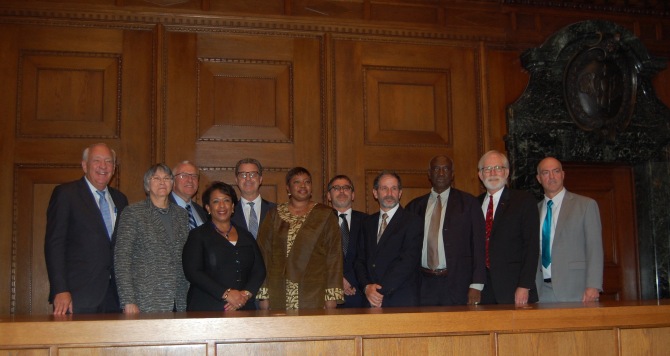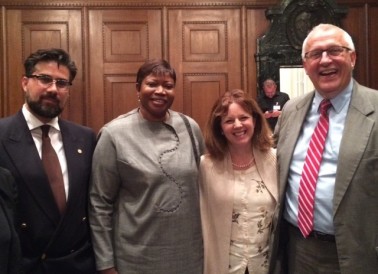|
||||
|
Special Features
ICTJ: World Report October 2016 – Transitional Justice News and Analysis
 |
ICTJ World Report October 2016 |
|
Global Centre for the Responsibility to Protect: Notes for the Next UN Secretary-General
|
||||||
|
Global Centre for the Responsibility to Protect: Crane 1 of 1 Atrocity Alert: Syria, Iraq, Burma/Myanmar and Accountability Watch
Atrocity Alert, No. 28

Atrocity Alert is a weekly publication by the Global Centre for the Responsibility to Protect highlighting and updating situations where populations are at risk of, or are enduring, mass atrocity crimes.
Syria
On 26 October airstrikes in Idlib governorate hit a complex of three schools in the town of Hass. At least 26 deaths have been reported so far, including 20 children. As relentless attacks on civilians and civilian infrastructure in Idlib, Aleppo and elsewhere in Syria continue, the international community is still struggling to halt the five-year civil war and hold atrocity perpetrators accountable. Following a fifth Russian veto on a Syria resolution at the UN Security Council on 8 October, the UN General Assembly held a special briefing requested by Canada – on behalf of 69 member states – on 20 October to determine whether to call for an Emergency Special Session. The Human Rights Council also held a special session on Syria on 21 October and adopted a resolution calling for the Commission of Inquiry on Syria to conduct an investigation into possible war crimes in Aleppo and identify those responsible for alleged violations of international law.
Iraq
Since the Iraqi government announced the launch of its offensive to liberate Mosul from the so-called Islamic State of Iraq and the Levant (ISIL) on 17 October, over 50 villages have been retaken and at least 10,725 civilians have been displaced by fighting. ISIL has conducted retaliatory attacks against Iraqi and Kurdish forces across the country, including in Kirkuk, Rutba and Sinjar. On 25 October the Office of the UN High Commissioner for Human Rights (OHCHR) said they had received preliminary reports of mass atrocities perpetrated by ISIL in areas surrounding Mosul, including the discovery of at least one mass grave, and expressed the “fear that these will not be the last such reports we receive of such barbaric acts by ISIL.” There have also been reports of ISIL fighters using civilians as human shields as Iraqi forces advance. It is essential that all parties participating in the battle for Mosul take effective measures to ensure the protection of all civilians in accordance with international humanitarian law.
Burma/Myanmar
On 9 October a series of attacks on border posts were carried out by a pro-Rohingya armed group in Burma/Myanmar’s Arakhan/Rakhine state. Reports of mass arrests and extrajudicial killings of Rohingya, a Muslim ethnic minority group who face systematic persecution by the government of Burma/Myanmar, have continued to surface since an army operation began on 10 October in response to the attacks. Since 23 October army officers have also forcibly removed an estimated 2,000 villagers from their homes. On 24 October the UN Special Rapporteur on the human rights situation in Myanmar, Yanghee Lee – together with four other UN Special Rapporteurs – issued a joint statement condemning human rights violations in Burma/Myanmar. The Special Rapporteurs called upon the government to undertake thorough investigations of all alleged abuses during Army operations and prevent incitement against the Rohingya.
Accountability Watch
During October several African states have formally challenged the capacity of the International Criminal Court (ICC) to conduct impartial investigations and trials and announced their intention to withdraw from the Court. On 26 October Gambia announced that it would join South Africa and Burundi in abandoning the ICC, noting that the decision came as a result of the Court seeming more like “an International Caucasian Court for the persecution and humiliation of people of colour, especially Africans.” Gambia’s human rights record has been widely criticized internationally and President Yahya Jammeh, who has been in power since a military coup in 1994, has been accused of threatening to exterminate the Mandinka ethnic group and of inciting violence against gays and lesbians. An investigation of potential mass atrocity crimes in Burundi is currently underway and South Africa was previously criticized for not arresting President Bashir of Sudan, under indictment for genocide and crimes against humanity, while he was visiting the country during June 2015 for an African Union Summit. On 25 October Botswana issued a press release criticizing the South African decision and saying that the government was turning its back on victims of atrocities and undermining the battle against impunity.
It is essential that all States Parties to the Rome Statute encourage Burundi, Gambia and South Africa to reconsider their positions. In contrast to the message sent by these actions, during September Gabon self-referred itself to the ICC following violence during the country’s August 2016 presidential elections. Of the 9 African cases currently being investigated by the ICC, the majority have been self-referred.
Connect With Us
IntLawGrrls: 70 Years Later: the Tenth International Humanitarian Law Dialogs in Nuremberg
“Let us leave here renewed in our devotion to justice – not just for the people of our own countries, but for the people of all countries. Let us leave here refreshed in our determination to defend human rights, to protect human liberty, and to uphold human dignity wherever and whenever it is threatened.”– Commemoration of the 70th Anniversary of the Nuremberg Trials, U.S. Attorney General Loretta Lynch (Sept. 29, 2016)
On September 29-30, 2016, the Tenth International Humanitarian Law Dialogs convened in Nuremberg, Germany. Normally held at the Chautauqua Institution, this year’s special location was chosen to commemorate the 70th anniversary of the close of the Nuremberg trials, where the Allied Powers tried Nazi war criminals for atrocities committed during World War II. Intlawgrrls, the Whitney R. Harris World Law Institute at Washington University in St. Louis and New York University’s Center for Global Affairs are among the sponsors and long-time supporters of the IHL Dialogs, which gather prosecutors, jurists, and nongovernmental partners to discuss issues involving international justice that extend beyond the walls of any one court or tribunal.

International Prosecutors at the IHL Dialogs in Nuremberg, with U.S. Attorney General Loretta Lynch
This year’s IHL Dialogs opened on Thursday, September 28 with an inspiring program in Courtroom 600, the small, iconic courtroom where 22 defendants were tried at the International Military Tribunal. The Keynote Speakers included ICC Chief Prosecutor Fatou Bensouda, who spoke powerfully about the shared responsibility that people and States around the world have to address atrocity crimes and the arc of justice’s continual bend towards accountability, and U.S. Attorney General Loretta Lynch, who gave a beautiful, reverent speech about the potential power of fairly-applied justice and the rule of law, stating that by seeking justice rather than vengeance, Nuremberg participants showed that “war does not have to be the final arbiter of human affairs.”
“Certainly the onslaught of evidence of man’s inhumanity to man can leave one dispirited and discouraged. But we cannot – and we should not – give in to despair, because the legacy of Nuremberg is that when we are called to confront the evil that walks this earth, we turn to the law. When we need to mete out justice to those who have reaped the whirlwind and revel in the chaos resulting therefrom, we turn to the law. And through the law we give voice to those shattered souls who seek redress, and we provide a reckoning to those who trade in fear and trembling. Let us never forget that within these walls, evil was held to account and humanity prevailed.” – Commemoration of the 70th Anniversary of the Nuremberg Trials,U.S. Attorney General Loretta Lynch (Sept. 29, 2016)

Professor Jennifer Trahan with Sierra Leone Special Court Prosecutor David Crane
On Friday, September 30, the day’s discussions centered on the 2016 IHL Dialogs’ theme, “A Lasting Legacy for the Future.” The Honorable Joseph Kamara(Attorney General of Sierra Leone and former Deputy Prosecutor of the Special Court for Sierra Leone) cited SCSL cases as examples of the intricacies in making prosecutorial decisions on how to charge crimes of sexual violence to accurately capture victims’ experiences, and gave an inspiring account of the mutually beneficial relationship that national and international courts can have as post-conflict states work to hold perpetrators accountable, create a factual record of atrocities, internalize past events and seek justice on behalf of victims. Professor John Q. Barrettprovided a perceptive historical analysis of the Nuremberg trials’ “shining moment of consensus” and explained how their setting in Germany, where lawyers were confronted first-hand with the war’s remnants and casualties, added to participants’ understanding of the trials’ necessity and historic importance. In his Keynote Address, Ambassador Hans Corell drew on lessons from his distinguished career in international diplomacy to highlight the global cooperation that will be necessary in addressing future humanitarian crises, especially in assisting populations that will be displaced by climate change in the coming decades. He challenged attendees to continue to evaluate the mixed record of compliance with the Nuremberg principles, including acts of aggression committed in modern times.

Professor Leila Sadat with ICC’s Sam Shoamanesh, Chief Prosecutor Fatou Bensouda, and Deputy Prosecutor James Stewart in Courtroom 600 on the occasion of the 70th anniversary of the judgments at Nuremburg.
The afternoon session of the Dialogs included a roundtable where Prosecutors discussed recent cases and addressed overarching practical and theoretical challenges facing their respective courts. ICC Chief Prosecutor Fatou Bensouda explained the ICC’s limited potential role in the Syria conflict, noting that any ICC jurisdiction would likely be narrow and based on personal jurisdiction over foreign nationals involved in the conflict (if any have the requisite level of responsibility for atrocities appropriate for ICC prosecution). ICTY Prosecutor Serge Brammertz noted that the breadth and depth of the Syria conflict might make it a better candidate for a locally-owned judicial process, but that it would be hard to find individuals perceived as neutral to run any effort. The Prosecutors also discussed important observations, such as how sexual violence and forced marriage cases were prosecuted differently but effectively in response to the different statutes and caselaw governing the various tribunals. Many Prosecutors, including Brenda Hollis of the Special Court for Sierra Leone and ICC Chief Prosecutor Fatou Bensouda, noted the need for greater transparency and outreach to ensure that societies understand courts’ mandates, hold realistic expectations of their roles and cooperate with prosecutions. Following the roundtable, German professors and historians provided an enlightening historical and cultural perspective on the evolution of Germans’ support of the Nuremberg trials throughout the twentieth century. Lastly, Professor William Schabasand Ambassador David Scheffer supplied a nuanced exchange of impressions about the trials’ legacy to wrap up the day’s discussions. The Dialogs officially concluded with the Issuance of the Nuremberg Declaration, composed and signed by all the international Prosecutors. Professors Sadat and Trahan are pleased that they, once again, could represent their respective schools and participate in the Dialogs. The Dialogs will return to Chautauqua, New York for their eleventh year in fall 2017.








